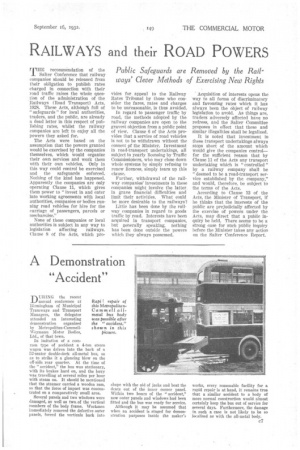RAILWAYS and their ROAD POWERS T E recommendation of the Salter
Page 57

If you've noticed an error in this article please click here to report it so we can fix it.
Conference that railway companies should be released from their obligation to publish rates charged in connection with their road traffic raises the whole question of the administration of the Railways (Road Transport) Acts, 3928. These Acts, although full of " safeguards " for local authorities, traders, and the public, are already a dead letter in this respect of publishing rates, whilst the railway companies are left to enjoy all the powersthey asked for.
The Acts were based on the assumption that the powers granted would be exercised by the companies themselves, which would organize their own services and work them with their own vehicles. Only in this way could control be exercised and the safeguards enforced. Nothing of the kind has happened. Apparently the companies are only operating Clause 11, which gives them power to "invest in and enter into working agreements with local authorities, companies or bodies running road vehicles for hire for the carriage of passengers, parcels or mechandise."
None of these companies or local authorities is subject in any way to legislation affecting railways. Clause 8 of the Acts, which pro vides for appeal to the Railway Rates Tribunal by those who consider the fares, rates and charges to be unreasonable, is thus avoided.
In regard to passenger traffic by road, the methods adopted by the railway companies are open to the gravest objection from a public point of view. Clause 6 of the Acts provides that a service of road vehicles is not to be withdrawn without the consent pf the Minister. Investment in road-transport undertakings, all subject to yearly licensing by Traffic Commissioners, who may close down whole systems by simply refusing to renew licences, simply tears up this clause.
Further, withdrawal of the railway companies' investments in these companies might involve the latter. in grave financial difficulties and limit their activities. What could be more desirable to the railways?
Little has been done by the railway companies in regard to goods traffic by road. Interests have been acquired in transport companies, but generally speaking, nothing has been done outside the powers which they always possessed. Acquisition of interests opens the way to all forms of discriminatory and favouring rates which it has always been the object of railway legislation to avoid. As things are, traders adversely affected have no redress, and the Salter Committee proposes in effect that these and similar illegalities shall be legalized.
It is noted that investment in these transport undertakings always stops short of the amount which would give the companies control— for the sufficient reason that by Clause 11 of the Acts any transport undertaking which is " controlled " by a railway company shall be "deemed to be a road-transport service established by the company," and would, therefore, be subject to the terms of the Acts.
According to Clause 13 of the Acts, the Minister of Transport, if he thinks that the interests of the public are prejudicially affected by the exercise of powers under the Acts, may direct that a public inquiry be held. There seems to be a strong ease for such public inquiry before the Minister takes any action on the Salter Conference Report.












































































































